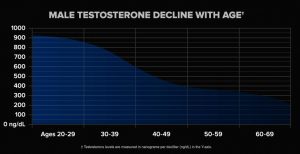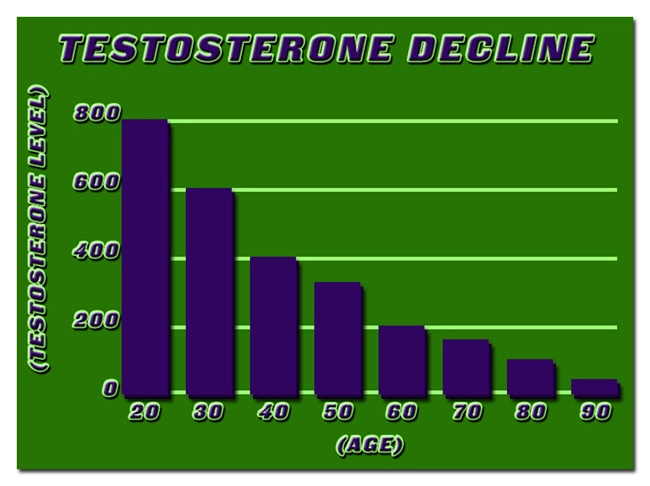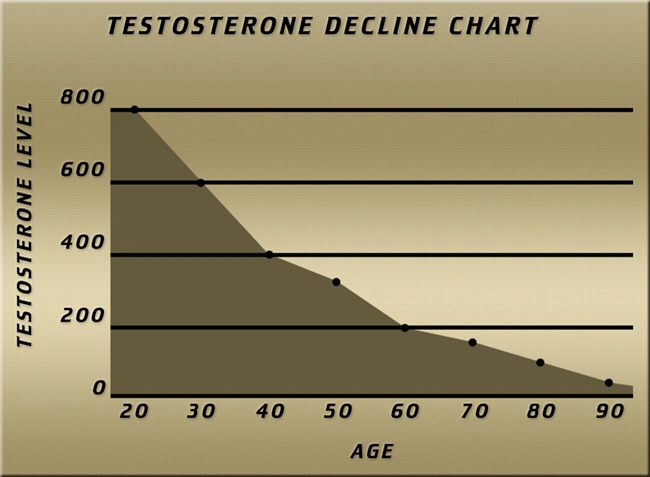
 If you're worried about Testosterone Replacement, consider this: men with low testosterone (Low-T) are not less likely to die.
If you're worried about Testosterone Replacement, consider this: men with low testosterone (Low-T) are not less likely to die.
On the contrary, according to a recent study, they are more liable to die!
Video Link: https://vimeo.com/255868863
Video Download: Click Here To Download Video
Video Stream: Click Here To Stream Video
 Men with Low-T over age 40 have an elevated risk of death over a four-year period compared to those with normal hormone levels, the study suggests.
Men with Low-T over age 40 have an elevated risk of death over a four-year period compared to those with normal hormone levels, the study suggests.
However, researchers caution that the link between low Testosterone and early death is still somewhat uncertain.
They added the possibility that an unknown factor is responsible for both Low-T and accelerated mortality.
Molly Shores of the VA Puget Sound Health Care System and the University of Washington, Seattle, led the study. The details are in the current issue of Archives of Internal Medicine.
A Very Wide Playing Field
Testosterone levels can be all over the range of measurements among men and even from individuals due to illness or stress. However, studies have reliably demonstrated that levels of Testosterone plunge as men age.
Testosterone levels pinnacle during men's late 20s but plummet soon after, falling about 1 to 1.5 per cent every year after age 30.
The decrease is considered due to  age-related changes in the testes, where the hormone originates, and in the brain.
age-related changes in the testes, where the hormone originates, and in the brain.
Low -T can lead to shrunken, weakened muscles and bone density, insulin resistance, reduced libido, lowered energy, irritability, depression, and a wide array of other health problems.
The fact that older men have far more health issues than younger men is undoubtedly the first link in the equation.
But the researchers went much further. They examined the connection between Testosterone levels and mortality in a total of 858 male veterans age 40 or older.
Subjects had their Testosterone measured at least twice between 1994 and 1999. The participants were tracked for an average of 4.3 years and a maximum of eight years until 2002.
About 19 percent had Low-T; 28 per cent (240 men) oscillated between low and normal levels, and 53 per cent had normal Testosterone levels.
Around 20 per cent of men with normal Testosterone levels passed away during the study, compared with 24.6 per cent of men with fluctuating levels and 34.9 per cent of participants with Low-T.
 Here is the critical part of the study: men with Low-T had an 88 per cent increase in the risk of death contrasted with those who had normal levels.
Here is the critical part of the study: men with Low-T had an 88 per cent increase in the risk of death contrasted with those who had normal levels.
The effect remained even after variables such as age, other diseases, and Body Mass Index (BMI) were considered.
The mortality risk for men with low Testosterone tumbled to 68 per cent after the researchers reviewed the data to exclude men who had died within the first year of follow-up.
The reason for this was to account for drops in Testosterone that may occur soon after surgery, injury, or severe illness.
However, the Link is Still Somewhat Uncertain
The researchers determined that the effect remained elevated after excluding early deaths suggests the relationship between Low-T and mortality is not merely due to insufferable illness.
That being said, since the current research is a retrospective study that depends on old medical records, it was forced to deduce that low Testosterone and increased mortality are linked, but not precisely how they are connected.
To determine that, future research that follows a group of individuals over a long time is necessary.
 "The men with low testosterone did have higher death rates, but it may be due to some other factor that we weren't able to measure," Shores told Live Science.
"The men with low testosterone did have higher death rates, but it may be due to some other factor that we weren't able to measure," Shores told Live Science.
Shores additionally stressed that the veterans are a unique subset of the population that suffers from more tribulations (both service-related and non-service related) and that future research should consider more diverse groups of men.
"They were probably more medically ill than most men their age," she said. "They all had an average of about five chronic illnesses."
Shores was cautious about recommending Testosterone replacement therapy for aging men, saying the conclusions of the study were unable to establish a definitive link between low Testosterone and early death.
Also, the risks and benefits of testosterone replacement therapy are not completely known.
"There's no link between testosterone replacement and prostate cancer, but the studies that have been done aren't big enough to detect if there's a link or not," Shores said.
If you are interested in increasing your Testosterone levels, contact our clinic for a free, no-obligation discussion.
References
https://www.medicinenet.com/script/main/art.asp?articlekey=63459
https://huddle.uwmedicine.org/news/study-testosterone-therapy-does-not-raise-prostate-cancer-risk
Contact Us Today For A Free Consultation
Dear Patient,
Once you have completing the above contact form, for security purposes and confirmation, please confirm your information by calling us.
Please call now: 1-800-380-5339.
Welcoming You To Our Clinic, Professor Tom Henderson.

- LabCorp Announces a Change to the Testosterone Reference Range [Last Updated On: April 16th, 2025] [Originally Added On: June 23rd, 2019]
- Important Facts About Testosterone Therapy Before Buying [Last Updated On: April 18th, 2025] [Originally Added On: July 13th, 2019]
- Soy: Does it Lower Testosterone? [Last Updated On: October 18th, 2024] [Originally Added On: August 30th, 2020]
- Testosterone Treatments May Successfully Reverse Type-2 Diabetes in Some Men [Last Updated On: April 15th, 2025] [Originally Added On: November 13th, 2020]
- Testosterone Replacement Therapy (TRT) May Prevent Heart Attacks and Diabetes [Last Updated On: April 21st, 2025] [Originally Added On: November 17th, 2020]
- Did You Know? Recent Studies Have Confirmed the Link Between Low Testosterone (“Low-T”) and Depression. [Last Updated On: April 17th, 2025] [Originally Added On: January 10th, 2021]
- New Study Finds Testosterone Does Not Increase Your Heart Attack Risk [Last Updated On: April 14th, 2025] [Originally Added On: January 11th, 2021]
- The Great Testosterone Debate [Last Updated On: April 20th, 2025] [Originally Added On: January 14th, 2021]
- Testosterone Replacement Therapy Lowers Heart Attack Risk [Last Updated On: April 19th, 2025] [Originally Added On: January 18th, 2021]
- New Study Says: The Benefits of Testosterone Replacement Therapy Outweigh The Risks [Last Updated On: April 22nd, 2025] [Originally Added On: January 19th, 2021]
- Male Menopause. Fact or Fiction ? [Last Updated On: April 23rd, 2025] [Originally Added On: January 20th, 2021]
- Testosterone: How Much Do You Really Know About This Masculine Hormone? [Last Updated On: October 6th, 2024] [Originally Added On: February 9th, 2021]
- Low-T: What are healthy levels of Testosterone and why is it difficult to measure? [Last Updated On: September 11th, 2025] [Originally Added On: April 3rd, 2021]
- Testosterone Therapy May Be Good for the Heart if You Have Low-T [Last Updated On: May 3rd, 2025] [Originally Added On: July 21st, 2021]
- A Recent Study Concludes: Testosterone DOES NOT Cause Prostate Cancer [Last Updated On: September 14th, 2025] [Originally Added On: August 16th, 2021]
- In the Battle Against Aging, When do the Risks Outweigh the Rewards? [Last Updated On: April 4th, 2025] [Originally Added On: August 18th, 2021]
- Testosterone Replacement Therapy Slows Prostate Cancer! [Last Updated On: April 2nd, 2025] [Originally Added On: September 13th, 2021]
- Research proves that Testosterone Therapy Boosts Fertility! [Last Updated On: April 5th, 2025] [Originally Added On: September 26th, 2021]
- Free Testosterone and Sex Hormone-Binding Globulin [Last Updated On: April 6th, 2025] [Originally Added On: October 15th, 2021]
- Testosterone Does Not Cause Heart Attacks [Last Updated On: April 7th, 2025] [Originally Added On: October 15th, 2021]
- Testosterone and Women [Last Updated On: April 8th, 2025] [Originally Added On: October 15th, 2021]
- Testosterone and Metabolic Syndrome [Last Updated On: April 3rd, 2025] [Originally Added On: October 15th, 2021]
- Testosterone and Disease Prevention [Last Updated On: March 31st, 2025] [Originally Added On: October 15th, 2021]
- Judge Vacates $140 Million Verdict in Testosterone Lawsuit [Last Updated On: April 1st, 2025] [Originally Added On: October 15th, 2021]
- Testosterone and Estrogen [Last Updated On: April 9th, 2025] [Originally Added On: October 16th, 2021]
- Testosterone and Aging [Last Updated On: April 10th, 2025] [Originally Added On: October 16th, 2021]
- Testosterone Replacement Therapy (TRT) Benefits [Last Updated On: April 11th, 2025] [Originally Added On: October 16th, 2021]
- Testosterone and Male Menopause [Last Updated On: March 30th, 2025] [Originally Added On: October 16th, 2021]
- Testosterone Battles Obesity [Last Updated On: March 29th, 2025] [Originally Added On: October 16th, 2021]
- Why You Need Testosterone Replacement Therapy [Last Updated On: May 14th, 2025] [Originally Added On: October 16th, 2021]
- Testosterone FAQ's [Last Updated On: May 13th, 2025] [Originally Added On: October 25th, 2021]
- How Testosterone Impacts Sexual Preferences In Men and Women [Last Updated On: March 28th, 2025] [Originally Added On: October 30th, 2021]
- Growth Hormone and The Thyroid Gland [Last Updated On: April 24th, 2025] [Originally Added On: November 19th, 2021]
- How Does Masturbation Affect Testosterone Levels? Exploring the Science [Last Updated On: May 24th, 2025] [Originally Added On: March 27th, 2022]
- Testosterone Therapy Increasingly Used to Help Men Take Control of Aging [Last Updated On: May 25th, 2025] [Originally Added On: May 30th, 2022]
- The many benefits of Testosterone Replacement Therapy (TRT) [Last Updated On: November 1st, 2025] [Originally Added On: June 13th, 2022]
- Tlando Testosterone - A Brand New Way to Treat Low-T Safely with a Testosterone Pill [Last Updated On: May 28th, 2025] [Originally Added On: July 12th, 2022]
- Safe Tlando Testosterone Changes Landscape of Low-T Therapy [Last Updated On: May 30th, 2025] [Originally Added On: August 15th, 2022]
- Systems to Monitor Testosterone Replacement Therapy (TRT) [Last Updated On: October 12th, 2025] [Originally Added On: September 21st, 2022]
- Testosterone May Help You Keep Your Job (Or Find Another) [Last Updated On: June 12th, 2025] [Originally Added On: October 4th, 2022]
- Toxic Chemicals are Killing your testosterone…And your Manhood! [Last Updated On: October 28th, 2024] [Originally Added On: October 10th, 2022]
- A new study reveals that Testosterone improves body composition in men with low testosterone! [Last Updated On: October 22nd, 2025] [Originally Added On: October 17th, 2022]
- A former Mr. Olympia speaks about testosterone [Last Updated On: October 10th, 2025] [Originally Added On: November 8th, 2022]
- Testosterone Blockers Thwart Melanoma [Last Updated On: June 9th, 2025] [Originally Added On: December 11th, 2022]








